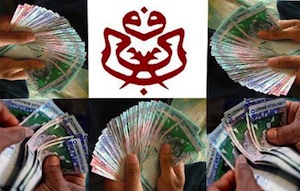Cleaning up money politics in Malaysia

In a memorandum on reform of political financing last year, TI-M said: “Money can disrupt the democratic principle of fair competition in elections and undermine proper political representation. Problems arise when organisations with private agendas provide large secret funds to political parties/candidates and expect something in return, compromising the quality of government.”
Salim Othman, Singapore Straits Times
UMNO veteran and former minister Abdul Kadir Fadzir resigned from the party last month after 56 years. His reason: He could no longer tolerate the practice of vote buying by Umno during elections.
His allegation was met by a swift denial from Umno. Cynics, however, accused the veteran politician of being guilty of the same crime – for allegedly using money to retain his position as head of an Umno division for three decades.
Despite drawing flak, Abdul Kadir has raised an issue that is rife in Umno and that threatens the effective functioning of democracy in Malaysia.
The issue has assumed greater importance as Malaysia gears up for a general election due by April next year.
Vote buying is part of a whole chain of money politics that thrives because politicians in power have easy access to funds which they can use to bribe voters at the polls.
The politicians themselves are bribed by the sponsors who funded their electoral campaigns, in return for favours once they are elected.
This issue of political funding is now the target of Prime Minister Najib Razak’s reform initiatives, which he vowed to initiate when he took over power in 2009. This was of course long before the former Umno veteran spoke about the evils of money politics last month.
Najib has said that he would introduce new regulations governing political finance as part of his reforms to transform Malaysia.
Under the Government Transformation Plan, new laws would be introduced to regulate political financing to restrain politicians from illegally using their party’s name to solicit funds. All funding should be channelled to an official party account.
Although Najib has not set a deadline for the regulations, the move should be applauded as this is the first of many steps towards curbing money politics, known to be rampant not only in Malaysia, but also in many other countries.
There are good reasons why regulation on political financing should be supported by all parties.
First, is the need to improve transparency in political financing to fulfil the principles of transparency, accountability and integrity that are in the Najib government’s transformation programme.
At the moment, there are no limits to the amount of donations to political parties and candidates. There is also no requirement for public disclosure of such contributions. Some of the donations are channelled directly to individual politicians instead of to their party.
Last December, a blogger had accused Deputy Finance Minister Awang Adek Husin of receiving cash contributions worth 100,000 ringgit (US$33,000) from a businessman, claiming that it was a bribe for a project.
The politician dismissed the allegation, saying that the funds were used for social development projects in his constituency although the money was wired to his personal account.
The case highlighted the lack of transparency in political contributions received by government politicians.
Second, political corruption, often described as the ‘mother of all corruption’, and money politics are detrimental to society and undermine the democratic process.
A study by Transparency International Malaysia (TI-M), an anti-corruption watchdog, found that money politics could pose serious corruption risks to the quality of government and democracy.
In a memorandum on reform of political financing last year, TI-M said: “Money can disrupt the democratic principle of fair competition in elections and undermine proper political representation. Problems arise when organisations with private agendas provide large secret funds to political parties/candidates and expect something in return, compromising the quality of government.”
It recommended several measures to reform political financing.
First, the Election Offences Act 1954 should be amended to require party election expenses to be independently audited by certified auditors before submission to the Election Commission. The Elections Act 1958 should also be amended to empower the Election Commission to investigate and verify financial reports submitted by political parties and candidates.
Second, political parties should be required by law to make full public disclosure of the amounts and sources of their financing and expenditure.
Third, there must be limits on contributions by Malaysian individuals and organisations or companies to political parties. Ideally, companies should be banned from making political donations. This is to stop those with a private agenda from influencing election outcomes.
Fourth, TI-M and other analysts suggest that the state should finance political parties and candidates to ensure that they have sufficient resources to run campaigns. This is also to ensure a level playing field at the polls.
Reforming political financing is an issue that should be treated with greater urgency as it is instrumental in the bid to curb political corruption.
The reforms are being initiated by PM Najib’s government certainly not in response to criticisms from Abdul Kadir but because of the conviction that political corruption has to be checked or it will metastasize into a terrible cancer pervading all levels of Malaysian society.

